I began Wartales knowing very little besides the concept. I knew it was a low fantasy world you've chosen to become mercenaries. I knew it was a turn based strategy game like Final Fantasy Tactics or X-Com, a genre that I enjoyed, but it also had an open world element. Could all of these elements come together to make a truly compelling game?
The answer came to me during my very first combat. My plucky band of four hopeful mercenaries were attacked by bandits. Adam, my archer, circled around back while a thief was busy battling Eric, my swordsman. Adam lined up his first shot in the first fight… and missed. Hitting Eric. Damaging their working relationship... and giving Adam the trait cross-eyed for flubbing so badly.
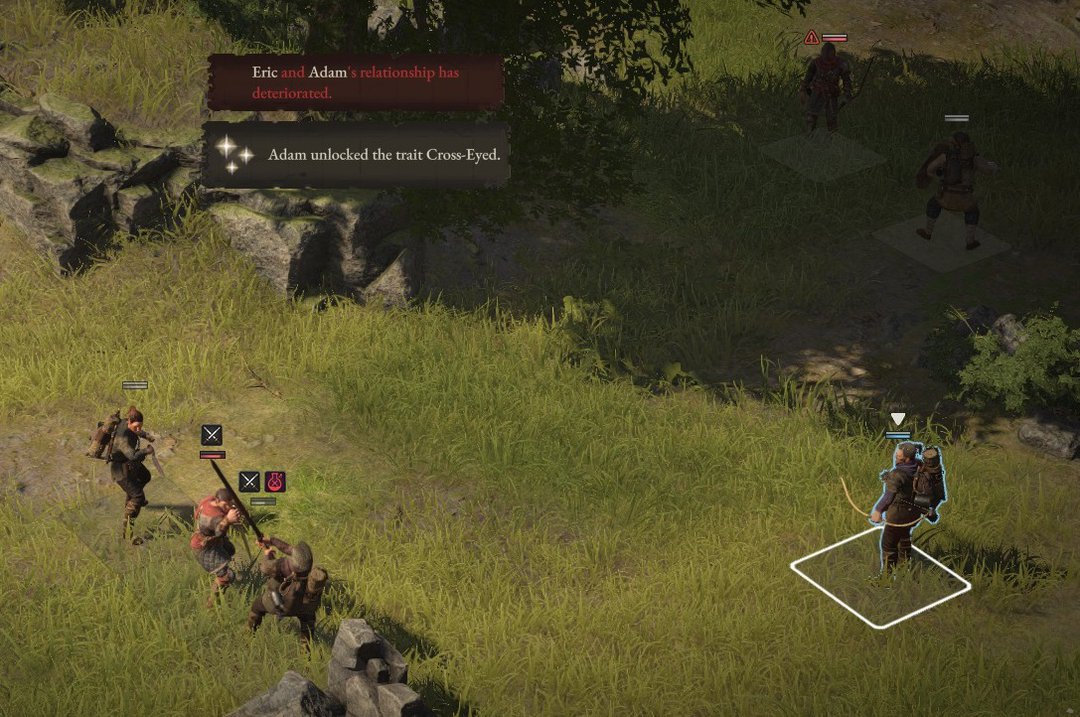
Just like that, I was hooked.
Author’s Note: this is a review of the first sixteen in-game days I spent playing Wartales, or about 4-5 hours. Since initially drafting this article, I have doubled that play time and still thoroughly enjoy the game: I hope to post a full concise review as a follow up, but this first article will hopefully help you determine if it is the right game for you. If you want just a quick synopsis, jump down to the final section “A Strange New Open World”.
What is Wartales?
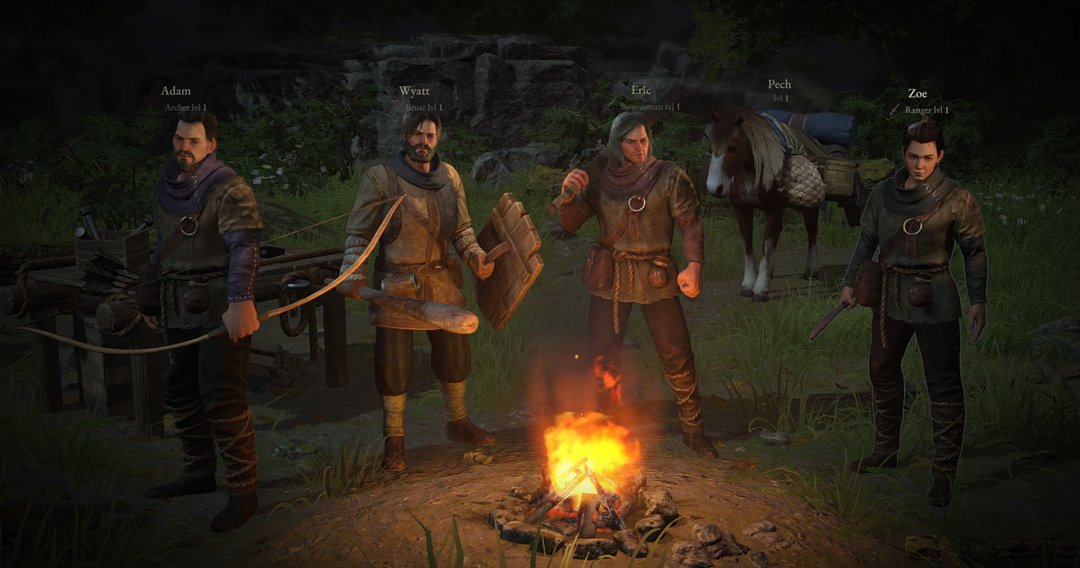
We had been friends since childhood, before the plague came. Always had each other’s backs, even as the ground withered and our town died around us. Eric had always been the bravest of us, and when he suggested for the dozenth time maybe it was time to leave, we did. Zoe found the tavern keeper’s old butcher’s knife, while Adam grabbed the hunting bow his family had always used. Me? Well, I hoped a club and a barrel lid would help save our sorry lives.
Wartales is a strange blend of strategy RPG and open world adventure, one that I honestly haven’t seen before. Typically, an RPG of this nature is built along the back of a grand adventure, some sort of world-shaking event or cosmic evil threatening to take over the land. However, this game takes a very different approach; it is gloriously mundane. I am about five hours into Wartales so far and that hasn't changed: you are simply a band of mercenaries looking for coin. If you have food, pay, and living soldiers, you can continue to explore and find new fights.
The humble tone is honestly both jarring and refreshing. When you first start, you are given three prompts to help you decide why your band got started: were you bandits with bad luck, or young farmer friends looking for adventure? The game gives you four characters to name and customize, each with a vague ‘class’ such as spearman, archer, or brute that points to their role, and it's off to the races. You are dropped of in a place called Tiltren County along a hillside: the ‘world map’ is a beautiful isometric landscape of rolling hills and dense forests, and you can direct your four friends (and pack mule!) wherever you want to go.
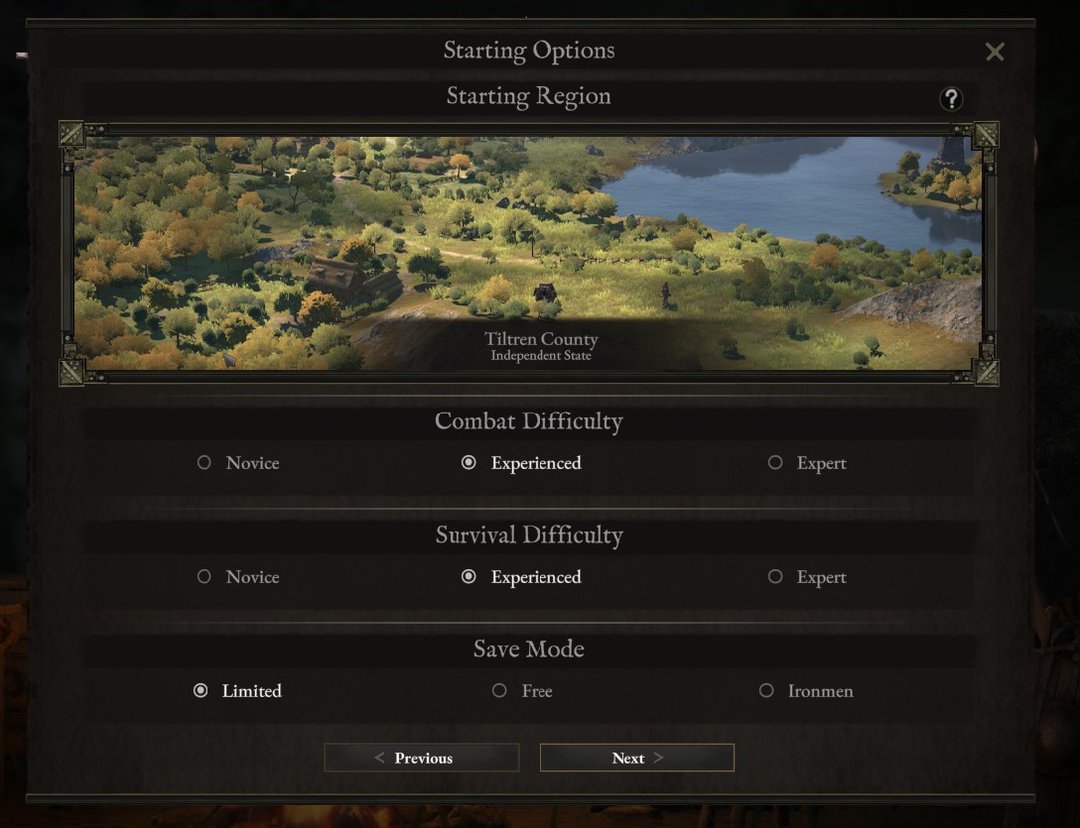
As a heads up, I did appreciate the amount of difficulty options available. Being able to choose if enemies would scale with my level or be tied to various regions, if finding food would be harder than usual, if I could have just one save or if this was an iron-man run... here are the options I went with for my first game.
Of course, this is a game about surviving through mercenary work, so I headed north to the first town I could. Thus, my first sixteen days of Wartales began.
The First 5 Days of Fighting, Fun, and Profit
Bandits. We all hated bandits, ever since they raided our home village years ago, just after everything started going wrong. Zoe had a taste for killing them since they burned her family home to ash, and hells, we were all desperate for honest coin and food. It felt strange, looking for trouble instead of avoiding it on the open road, but after your first brush with death, it all begins to blur together.
While Wartales does explain things with pop up tips, there is no tutorial: you are dropped off just outside town, and are told to be on your way. First combat comes quickly, and despite a harsh lesson about firing into melee with archers, is pretty easy with a four-on-two fight. You make it to Stromkapp, a small town where you start to get a real handle as to how the core gameplay loops are going to work out.
The most important part about town life is understanding the tavern: this is where you can rest without spending food (but costs money), where you can hire new mercenaries for your warband, and most importantly find jobs. There are two quest givers: The Emissary essentially has the bounty board for the county, putting up the names of bandit gangs and other standard fare. The Informant has more unique quests, but he was asking for influence to give me his quests, so I decided to go bandit hunting to start.
Loading up with multiple bounties, the emissary marked areas on the map where they might be, and off I went. A wonderful thing about Wartales is how alive the world feels: I quickly ran into refugees on the road asking for food (which I could give in exchange for influence), merchants selling goods, guards checking for stolen goods, and, unfortunately, bandits. I heard a shout, and suddenly I discovered that the woods let you hide out of sight and I was quickly in combat.
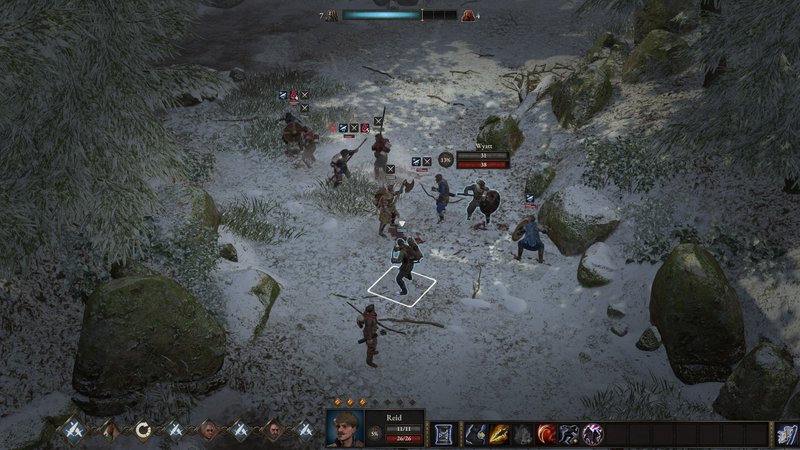
Combat is a simple, brutal, and very effective affair. This is not the realm of anime called shots or ttrpg style wandering heroes: if you are outnumbered and out-positioned, you are going to have a bad time. If you are familiar with Final Fantasy Tactics or X-Com, you will get the basic understanding of how the system works, with two very important differences: Engagement and Valor.
Engagement is a mechanic where if you attack an enemy with a melee weapon, you and them are now locked in combat. In game terms, you’ll see characters who are engaged animated as sparring, trying to find a way past blocked attacks. By comparison, if you attack someone who is already engaged, you get extra bonuses that stack up as someone is surrounded. Leaving engagement gets someone to attack you for free, but there are actions that let you dash away, or dash in, or get ambush attack damage: it's a very, very versatile system that you have to get good at quickly.
Valor points on the other hand are a sort of shared resource for your whole party. While each character gets the ability to move and a basic action, by spending a valor point you can use special tricks. At game start, characters start with a small boost you can choose, such as a dash that lets them break engagement for free or the ability to staunch bleeding wounds. By level three however, you begin to unlock strong area of effect sweep attacks, the chance to throw smoke bombs to cause chaos, and more.
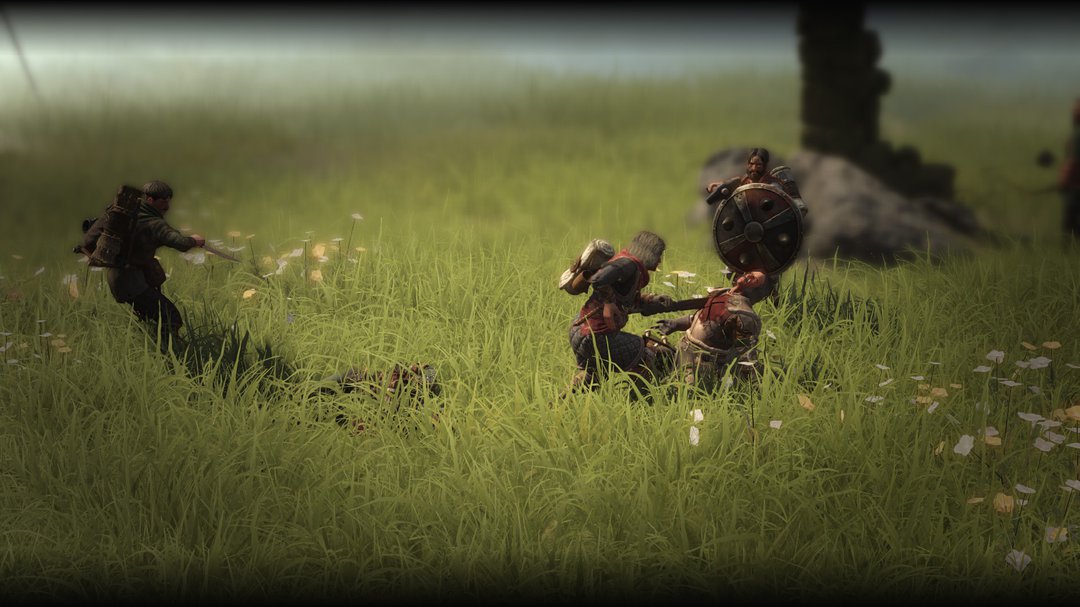
I think some games like X-Com do a better job of adding flash and action to their turn based fights, but when you get a close up killing blow animation, it feels real good.
If you understand how to use these two mechanics well, you can get a lot accomplished very quickly. My standard tactic became using my character, the ‘brute’ with club and shield to engage and keep someone busy while Zoe ran around back getting extra damage with their dagger. Eric’s old broadsword could hit multiple characters at once and needed to be positioned carefully, and Adam (as long as you had clear sight lines) was consistent ranged damage.
I found the bounties soon enough, and while the first fights against wandering bandits were hard, figuring out the core mechanics can help you deal with superior numbers or harder hitting foes pretty consistently. I wandered back using the woods and was able to dodge bandits by seeing them patrol, and even found some boars to fight in order to get free food.
Even just 4-5 days into the game, I could tell the mood that Wartales was attempting to accomplish: a game that punished you for getting too greedy or by making missteps, but fair and let you set the pace. Want to travel by road? It was faster and sometimes safer, but you were an open target. You could push an advantage in combat using valor points, but using up the resource could leave you vulnerable to later fights since they replenished during rests.
Plan out your character placement and use of special skills, and you are rewarded with some loot and living to fight another day. Get sloppy and well, that’s how you end up with Adam shooting Eric in the back.
Foraging, Crafting, And Pay (Skills!)
Suddenly, we had money. Hells, we had more money than I had ever seen as a farmhand. Still, we’d need to take on more jobs to settle down somewhere, and to take on more jobs, we’d need to have better supplies. Suddenly, our farmers' rags were replaced with armor - purchased and uh, scavenged. Adam had always loved repairing things, so we got him workshop supplies. Meanwhile Zoe, crafty as ever, decided to try and learn how to create medicine from scratch. When the first poultices for cuts didn’t kill Eric, we all came around to the idea.
As for me? Well, somehow it became my job to figure out how to cook the boars that kept finding us as we wandered the countryside…
That’s one section of the game: finding jobs, getting into fights, and getting paid. You wander a beautiful isometric world map, having to keep an eye out for danger. It’s rewarding enough as a gameplay loop, but fortunately that’s not everything. You aren’t a lone soldier, but a band of mercenaries after all. Your team has a fatigue meter, forcing you to rest and replenish everything from valor points to repairing your gear.
Your camp starts out… sparse, to say the least, only a fireplace to gather around and eat the rations you have. Yes, every few days you need to pay your soldiers, but you need to feed them as well. This is where you will see a theme pop up: you can buy cooked food (or many other supplies), but it’s cheaper to buy individual ingredients and put them together yourself. Yes you can find merchants for what you need, but becoming self reliant is the name of the game.
This is where professions come in. Your first four characters are blank slates, and as you interact with various vendors and locations, you will begin to unlock them. If I was to give you flat out advice, the Tinkerer and Cook professions are ones you will want immediately; all professions are useful, but these two feel required. With a Tinkerer, you build camp items like work benches, tents, and cooking pots, each adding benefits when staffed by your team. The cook? Well, it's real cheap to bake bread.
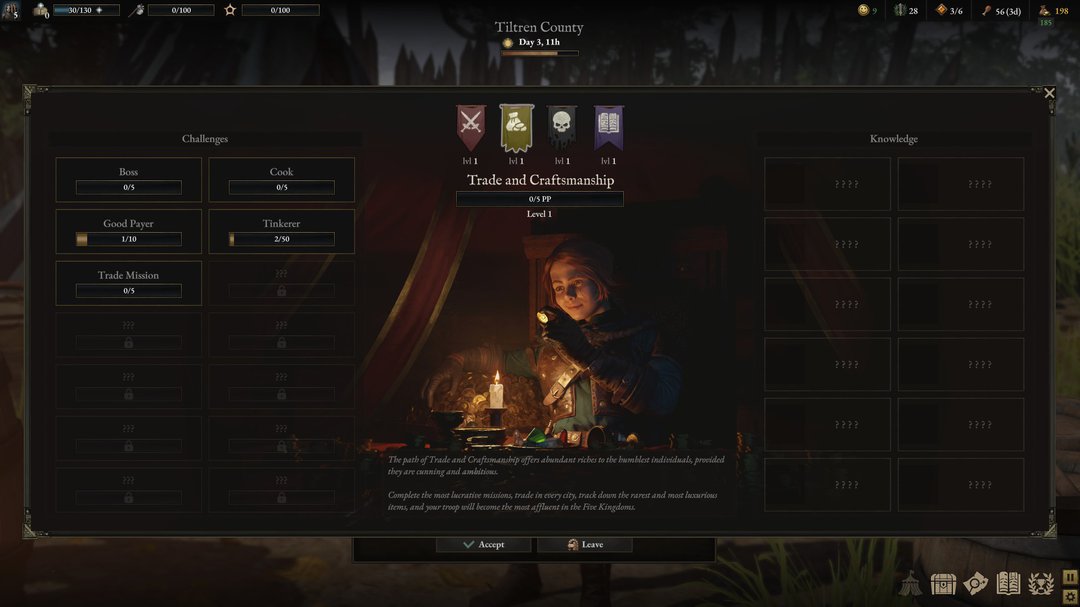
I'm not even getting into the paths system in Wartales, which rewards your warband with upgrades based on what sort of actions you choose. While I ignored it this run so far, there is a path called 'Crime and Chaos'...
While these two are necessities at first, there’s value in all of the ten I’ve run across. Blacksmiths let you craft your own gear in a reliable fashion than just looting bodies, while alchemists can make potent medicine or let you throw explosives. Other ones such as miners let you collect materials much easier than just wandering the map, and finally the thief will unlock the very valuable skill of lockpicking. Most professions seem to have a small dexterity mini game associated with them that makes you feel like you earned their bonuses.
Around the 5th day in Wartales, I was realizing exactly how compelling that overland world map was going to end up being. On one hand, you are absolutely driven towards adventuring across the entire map to look for iron ore, new locations, and treasure chests to unlock. On the other hand, you have this constant pressure on your soldiers to keep focused on just food and coin. While in this first playthrough I was trying to stay ‘honorable’, I can certainly see how a desperate warband might attack a merchant or two in order to resupply and keep adventuring.
The Art Of Meddling In Other People’s Affairs
It felt strange, when people started asking us for help. All of us had been farmhands, never given a second thought. Now after just a week in Tiltren, several villagers had heard how we had gotten lucky taking out the local bandits and had spread word. Eric was grinning like an idiot when he showed us how much was being offered to us already. Of course, it was never that simple. One set of refugees begged us for help even as another set of villagers demanded their deaths. Saints help me, we were the sell swords in the midst of it all.
By the 10th day in Wartales, I found my footing in the core gameplay loop and was finding it incredibly satisfying. I had taken out a lot of simple bandit squads, hunted some boar packs for free food and experience, and started to explore the map. My camp had a cooking pot and a tent and Eric had started crafting us real weapons. I’d head back to town every other day to cash in rewards and resupply.
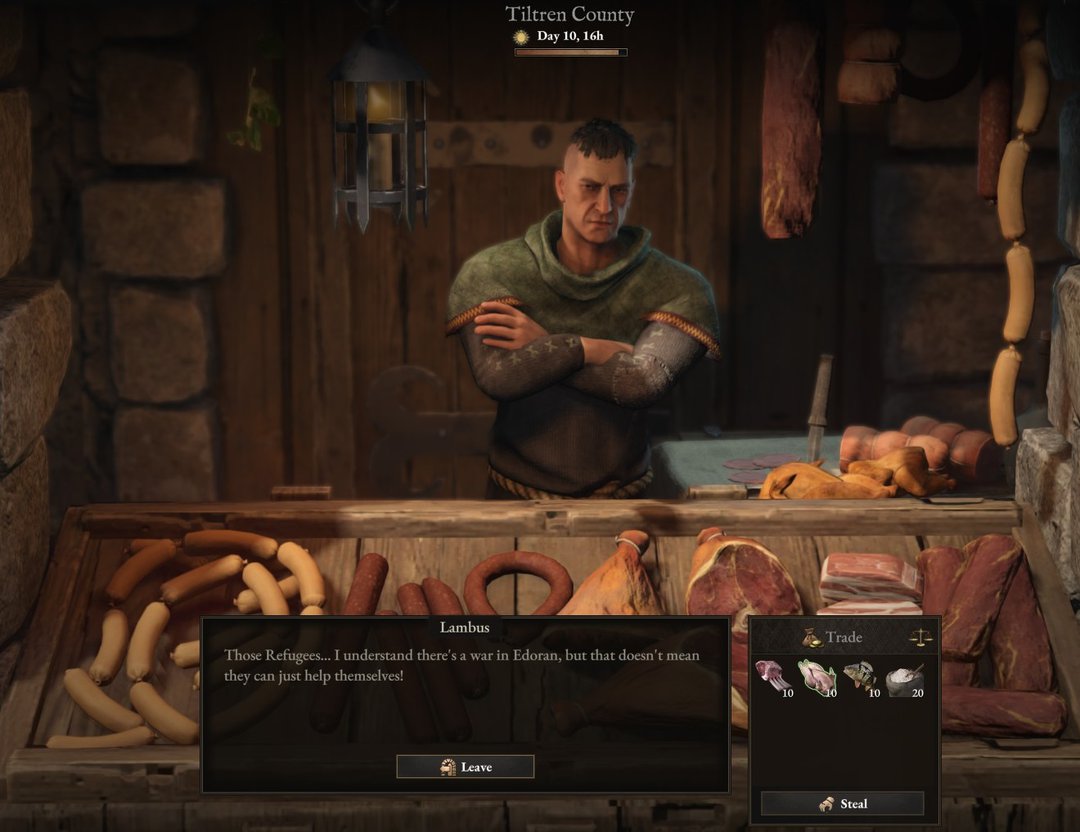
As you travel and talk to NPCs, the main problems of a region will slowly come into focus. Its up to you in how you react.
It’s where I also began to have a chance to explore a little more, take bigger walks away from town as my confidence rose and I could create enough medicine and armor repair kits. Really, really see the map. Tiltren alone has 28 locations to investigate, and many hint at the story playing out in the region around you or a full on quest.
Two examples (with minor spoilers): While looking for supplies, I found a family farm that wasn’t abandoned but had blood all over it. A woman was grieving in the corner talking about a tragedy and a husband who had gone mad. There was no specific quest given with this, but hints of the story continued to show up at other locations. One of which was a solitary sellsword who was hiding after being involved in trying to loot the barn but had wanted nothing to do with killing innocents. They had hidden from the other bandits nearby, and thus I got my 5th party member for free, choosing to trust them.
The other example was how I found an abandoned sheepfold that actually had a family hiding inside of it. They were refugees from Edoran, and this clicked with the ambient storytelling that I had been getting for the last few hours: all along the roads in Tiltren, bands of refugees wandered about. You could attack them to try and score loot or give them supplies in mercy (and raise your influence). Slowly, a story was coming together based on snippets of dialogue that some tragedy had befallen a nearby kingdom, and now this backwater hinterland was suddenly stuffed with new people, something that the locals sometimes… did not take kindly to.
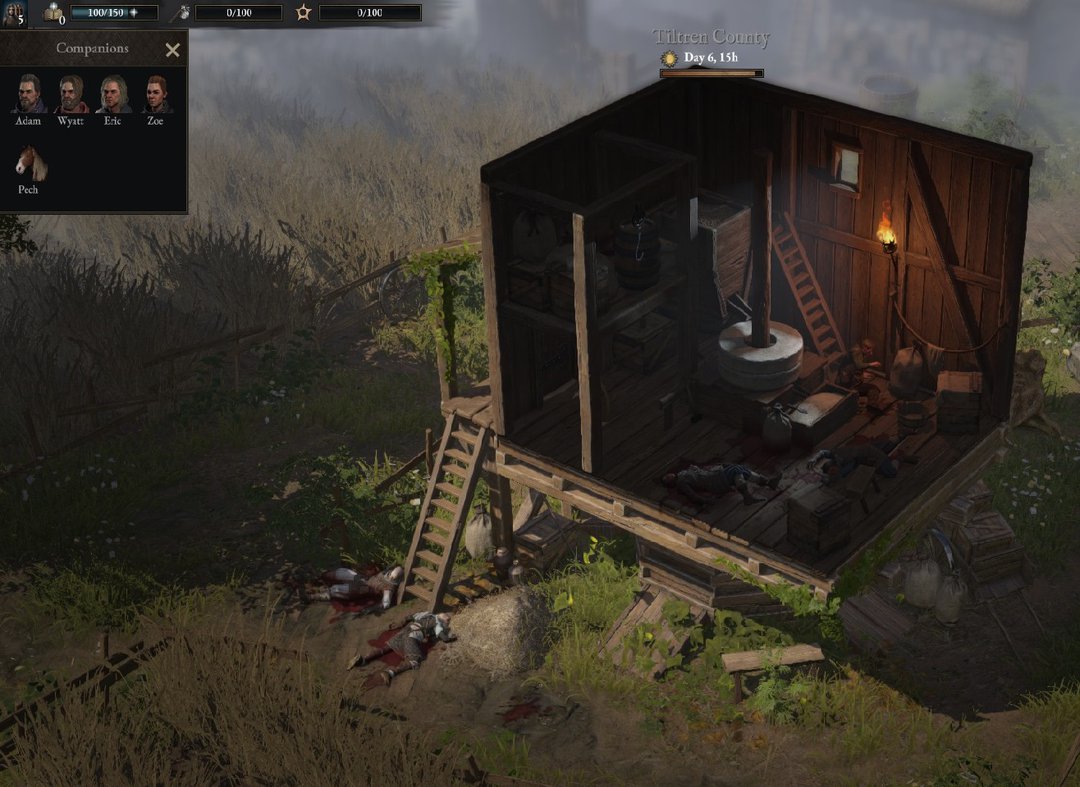
Interacting with a location gives you access to look for materials, talk with NPCs, or occasionally come across reminders as to how bad things are out there.
The sheepfold event did turn into an actual quest, one where I could help them stay in the sheepfold… or try and kick them off the property. You get to choose, and it started to click how you interact with the world’s story: you aren’t heroes in the traditional sense, but your presence as a hirable warband molds and shapes the region. There are certain ‘region quests’ that force you to make a choice between two sides. In Tiltren, it seemed to be shaping up to be siding with angry locals or desperate refugees.
Make no mistake: this isn’t a cut and dry good versus evil. I wanted to side with the refugees, taking pity on their plight as I slowly learned more as to why things must be so bad. However, some of the people promising to pay me to save them were also bandits, stealing food from farmers. The choice is yours, but it might not always be easy.
The Casualties Of War
We had been doing so well. So many fights with barely a scratch, thanks to Adam’s arrows and Eric’s new armor. Yet every day, we were running into more and more desperate people. People who drew swords first before saying hello. Saints forgive me, I couldn’t save them, even as I saw them swinging the hammer down…
I meant it when I said that Wartales was fair, but punishing. It was only a matter of time before I over extended. By around the 15th day, many basic wandering bandits and boars weren’t a problem. I recruited a 6th member of our team, an axe wielder who I named Nella, and now we had a solid front line and two very scary backstabbers in Zoe and Reid. My pony, Pech (“Bad Luck” in German), had leveled up and could be recruited as a fighting member. While he just ran at an enemy, they had a big chunk of health, tying someone up while my team could close in. The tactic of engaging then ambushing hadn’t failed yet.
This changed as I wandered up into the mountains to handle a large quest. It seemed like a lot of roaming bands could be found in the snowy peaks, but heck, I needed the snow irises growing there to make medicine anyway. So I explored, battling several enemies in a row, clearing the quest, and decided to make my way down the far side. This is where I ran into the ‘deserters’: not just bandits, but a small army contingent, outnumbering 8 to 7.
Suddenly, my engagement tactics worked against me. Caught in melee, their archers had fire arrows, causing harsh penalties to those they lit up. Heavy sweeping mace attacks are telegraphed, and I had always been able to dodge them until this fight, where their fighters kept me tied up while I tried to break free and reposition. I took out their archers, but their warriors had more armor than anything I had fought before, slowing down the fight as the poison and fire whittled away at my health.
When a character goes down to 0 health, you enter a ‘dying’ state, where all you can do is move. Any more hits drop you for good; this is where having the first aid skill is really handy, but you need valor points to use it, and I was all used up from the fights just before this one.
Soon enough, myself, Nella, and Zoe were all at 0. Their team was half dead, but I was limping to the finish. Fire was everywhere. You are given the ability to choose who goes next in your turn order, something that can both save you and damn you. Zoe had already gone in a turn and a hammer blow was already set to hit. I managed to get Nella out of the way, but-
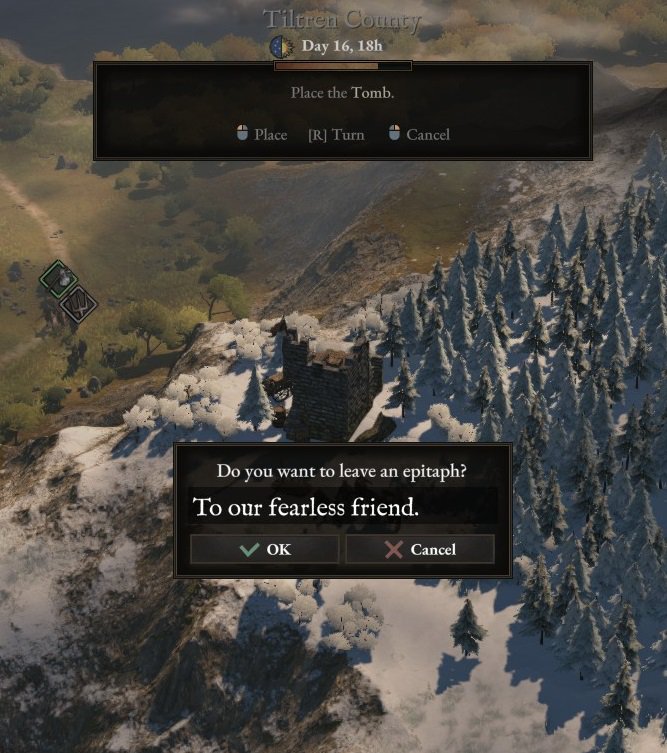
The prompt to add an epitaph just makes it so much worse.
When someone dies, you can take their body as an inventory item. Choose where to bury them. I buried them right near the cliff edge they had helped me conquer. Because of her amazing early abilities, we had thrived and had enough gold to last over a week even with resupplies. But now… now it was time to find some other wayward soul looking for quick coin. And so the warband moved on.
A Strange New Open World
In playing the first 16 days of Wartales, I fell in love with it. It has a gameplay loop that is straightforward and also open ended. Since I started writing this, I’ve more than doubled my playtime and I keep finding new and interesting things that are fun and exciting. I’ve left the first zone, I’ve run into more organized bands of soldiers, and without spoiling anything, run into elements that take Wartales from a middle ages reenactment game to definitively low fantasy in scope.
The game can be odd, don’t get me wrong. It feels very strange the first time you are put on the map and have literally no goals besides finding ways to keep your crew happy. It definitively feels like an open world game in how it operates, but with it being a squad based game, the premise becomes refreshing again. In completing the story quests for Tiltren County, I felt as though I had an impact on the region without it coming across as being some shiny jrpg set of heroes. I don’t know if it’s going to be for everyone, but it was too fascinating a combination for me to pass up.
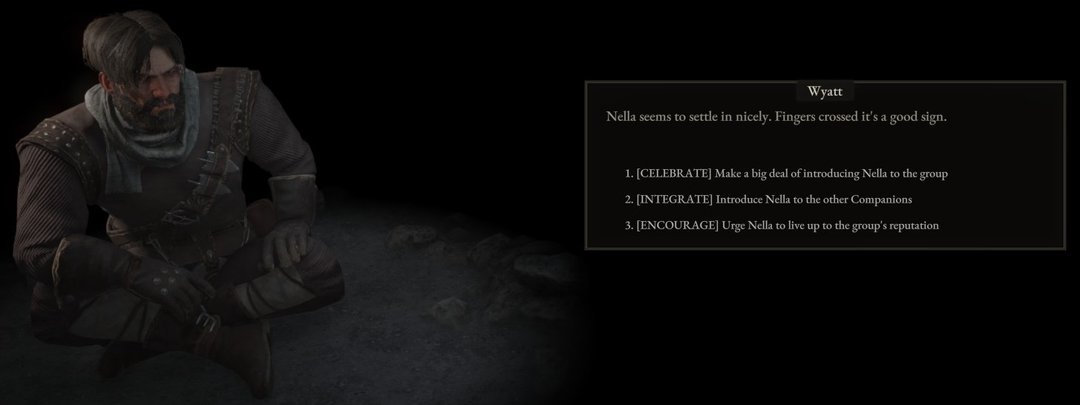
There is another layer in how party members will react to current events: bonding together during good times, or falling apart during bad ones. There is a relationship system of some sort also at play.
In summary, if you like Fire Emblem or X-Com, you’ll probably find something to love here. Fights feel brutal and are unique enough from other offerings in the strategy RPG genre, while the overland exploration and ways you can improve your professions and camp is really engaging. I am ashamed to say I’ve run into the ‘just one more day’ situation with Wartales at least twice, staying up far too late.
It’s not perfect. I can see how after 15 hours, the pace could feel slow to some players as you march around the map, oftentimes doubling back to get medicine or new soldiers. While combat has gotten more complicated and deadly in the new zone, it's more of the same. A lot of professions rely on dexterity mini games, like lockpicking, and that might be something you love or hate. I’m excited to drop another 15+ hours on this title, but I don’t yet know how it will scale as I keep exploring the world.
 Wartales
Wartales
Developer: Shiro Games
Publisher: Shiro Unlimited
Platforms: PC
Price: $34.99
Release Date: April 12, 2023
Review Copy: This review copy was given to us by the publisher.
Regardless, at a base cost of $35, Wartales is worth it for me. Even if there is no definitive ending, clearing just a few counties of all their quests and exploration is going to take me over 30 hours of gameplay. Keep in mind this is a Shiro Games title, the company behind Northgard. Even though that game has been out since 2016, they have continuously supported it with both free and paid expansions, so there are probably new counties, new classes, and other exciting updates in the works for years to come.
If you like Strategy RPGs, Wartales is a must-play. Even if it isn’t your usual cup of tea, I firmly believe you’ll appreciate such a unique take on the genre and what it has to offer. Besides - whenever you have a chance to make your own warband and name everyone after your friends, it's always a good time recounting their exploits as they try their best not to die.